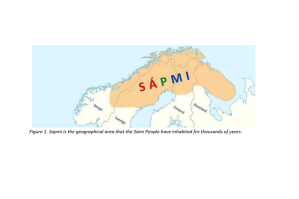 Work Package 9 (The ArcticDefinitions of the Arctic vary according to environmental, geographical, political, cultural and scientific perspectives. Some scientists define the Arctic as areas having a high latitude, long winters, short, cool summers,... More Resort: increasing benefits and reducing impacts from developing ArcticDefinitions of the Arctic vary according to environmental, geographical, political, cultural and scientific perspectives. Some scientists define the Arctic as areas having a high latitude, long winters, short, cool summers,... More tourism) has released a new deliverable report: Recommendations for improving tourist policies and regulations (available for download below).
Work Package 9 (The ArcticDefinitions of the Arctic vary according to environmental, geographical, political, cultural and scientific perspectives. Some scientists define the Arctic as areas having a high latitude, long winters, short, cool summers,... More Resort: increasing benefits and reducing impacts from developing ArcticDefinitions of the Arctic vary according to environmental, geographical, political, cultural and scientific perspectives. Some scientists define the Arctic as areas having a high latitude, long winters, short, cool summers,... More tourism) has released a new deliverable report: Recommendations for improving tourist policies and regulations (available for download below).
The objective of WP9.2 is to work with Sámi Peoples to review, summarise and if needed, suggest revisions of policies and regulations and to develop Sámi guidelines for tourists. The background to this work is that the Sámi communities in Finland were concerned about cultural appropriation from tourist businesses and disturbances from dog sledding. WP 9 found out that the Swedish Sámi organisations started to develop a certification system for Sámi tourist business in the 1990s, and that Norwegian Sámi communities has a general low level of conflict with tourist activities. The acceptance of Sámi rights as an IndigenousBelonging to a certain place. Indigenous people are distinct ethnic groups that have historic connections to people who lived in a territory prior to the area being colonized or coming... More People may be a reason for the difference between Norway, Sweden and Finland. Norway is the only Scandinavian country that has ratified the ILO 169. In Norway motorised tourism is highly restricted, while Sweden has the most liberal laws for the use of snow- mobiles and helicopters.
Based on an analysis of existing policies, regulations and the results of our 4 participatory workshops WP 9 recommends Sweden and Finland to ratify and incorporate ILO 169 in their constitutions. It is also recommended that municipalities start to raise awareness amongst their inhabitants about Sámi culture, Sámi languages and Sámi businesses to prevent racism towards Sámi People. Further it is important that the Sámi communities take responsibility to build competence, and to work together with tourist businesses to mitigate conflicts between tourism and Sámi interests.
All deliverable reports from INTERACT III can be found on the INTERACT website under “Deliverables”.
